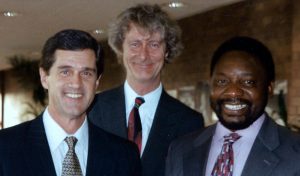This blog originally appeared in the Gerontology Institute blog.
by Steven Syre, Gerontology Institute
 An Illinois man who reached his normal retirement age in June of this year discovered he had a big pension problem. The company he expected to pay the pension said it didn’t exist.
An Illinois man who reached his normal retirement age in June of this year discovered he had a big pension problem. The company he expected to pay the pension said it didn’t exist.
The man came to the Pension Action Center for help through the Illinois Pension Assistance Project. PAC counselor Susan Hart and attorney Sophie Esquier soon discovered the event that caused their client’s immediate problem had taken place more than 40 years earlier. The event was the Vietnam War.
The client had worked for GTE Automatic Electric from May 1971 to October 1983, a length of time that clearly gave him vesting rights in the company’s pension plan. But during that period, he had temporarily left his job to serve in the military. His period of wartime military service covered more than two years between 1972 and 1974.
The Gerontology Institute’s Pension Action Center is part of the McCormack Graduate School at UMass Boston. It provides free legal assistance to low- and moderate-income workers, retirees and their survivors in the six New England states and Illinois whose pension benefits have been wrongfully denied. This is one in an occasional series of posts about cases the center pursues on behalf of its clients.




